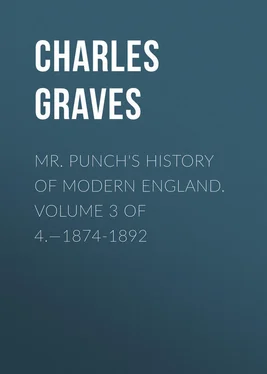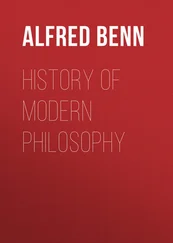Charles Graves - Mr. Punch's History of Modern England. Volume 3 of 4.—1874-1892
Здесь есть возможность читать онлайн «Charles Graves - Mr. Punch's History of Modern England. Volume 3 of 4.—1874-1892» — ознакомительный отрывок электронной книги совершенно бесплатно, а после прочтения отрывка купить полную версию. В некоторых случаях можно слушать аудио, скачать через торрент в формате fb2 и присутствует краткое содержание. ISBN: , Издательство: Иностранный паблик, Жанр: foreign_prose, foreign_humor, на английском языке. Описание произведения, (предисловие) а так же отзывы посетителей доступны на портале библиотеки ЛибКат.
- Название:Mr. Punch's History of Modern England. Volume 3 of 4.—1874-1892
- Автор:
- Издательство:Иностранный паблик
- Жанр:
- Год:неизвестен
- ISBN:http://www.gutenberg.org/ebooks/47300
- Рейтинг книги:3 / 5. Голосов: 1
-
Избранное:Добавить в избранное
- Отзывы:
-
Ваша оценка:
- 60
- 1
- 2
- 3
- 4
- 5
Mr. Punch's History of Modern England. Volume 3 of 4.—1874-1892: краткое содержание, описание и аннотация
Предлагаем к чтению аннотацию, описание, краткое содержание или предисловие (зависит от того, что написал сам автор книги «Mr. Punch's History of Modern England. Volume 3 of 4.—1874-1892»). Если вы не нашли необходимую информацию о книге — напишите в комментариях, мы постараемся отыскать её.
Mr. Punch's History of Modern England. Volume 3 of 4.—1874-1892 — читать онлайн ознакомительный отрывок
Ниже представлен текст книги, разбитый по страницам. Система сохранения места последней прочитанной страницы, позволяет с удобством читать онлайн бесплатно книгу «Mr. Punch's History of Modern England. Volume 3 of 4.—1874-1892», без необходимости каждый раз заново искать на чём Вы остановились. Поставьте закладку, и сможете в любой момент перейти на страницу, на которой закончили чтение.
Интервал:
Закладка:
Then we jump to A.D. 2000, but even then the wildest stretch of Punch's imagination does not exceed the establishment of conscription and the raising of the Army to a million men. Finally in his last forecast Punch is reduced to solving the problem by an insurrection under a popular soap-boiler, the seizure of the leaders of the two parties, and the banishing of both "Scuttle" and "Grab" from the political dictionary.
With the return of the Conservatives to power, we find that Punch , so far from rebuking the Government for their expenditure on bloated armaments, develops into something like an alarmist on the subject of national preparedness and the folly of "cheap defences." The inefficiency of the Army and Navy is a constant theme from 1887 onwards. The bursting of big naval guns, the badness of munitions and designs for battleships are dealt with in bitter satirical verses: while the damaging report of the Parliamentary Committee on Army equipment and stores prompts a series of advertisements of the "Benevolent Bayonet," the "Blazing Breech-loader," the "Comic Cartridge," and so on. Dishonest contractors and incompetent officials are attacked as "the Vultures of Trade" and "the Vermin of Office and Mart." The persistent discouragement of volunteers by the military authorities was an old grievance of Punch's , and it crops up in this year in connexion with the removal of the camp from Wimbledon by order of "George Ranger." Indeed, the bitterness of Punch's attack on the Duke of Cambridge revives the memories of the 'forties, when a duke, royal or otherwise, was his favourite cockshy: —
Snubbing the Volunteers
Some prate of patriotism, and some of cheap defence,
But to the high official mind that's all absurd pretence;
For of all the joys of snubbing, there's none to it so dear,
As to snub, snub, snub, snub, snub, snub, snub the British Volunteer!
A patriotic Laureate may bid the Rifles form,
And Citizens may look to them for safety in War's storm;
But Secretaries, Dooks, and such at this delight to jeer,
And to snub, snub, snub, snub, snub, snub, snub the British Volunteer!
A semi-swell he may be, but he may be a mere clerk,
And he's an interloper, and to snub him is a lark.
Sometimes he licks the Regulars, and so our duty's clear,
'Tis to snub, snub, snub, snub, snub, snub, snub the British Volunteer!
He hankers for an increase in his Capitation Grant,
It's like his precious impudence, and have the lift he shan't.
What, make it easier for him to run us close? No fear!
We'll snub, snub, snub, snub, snub, snub, snub the British Volunteer!
He has a fad for Wimbledon, but that is just a whim,
And as eviction's all the go, we'll try it upon him .
He's not an Irish tenant, so no one will interfere,
When once more we snub, snub, snub, snub, snub the British Volunteer!
His targets and his tents and things are nuisances all round,
As Jerry-Builders, Dooks, and other Toffs have lately found,
Compared with bricks and mortar and big landlords he's small beer,
So we'll snub, snub, snub, snub, snub, snub, snub the British Volunteer!
The Common's vastly handy, there's no doubt, to chaps in town,
And crowds of Cockneys to the butts can quickly hurry down;
But what are all Town's Cockneys to one solitary Peer?
No; let us snub, snub, snub, snub, snub, snub the British Volunteer!
Your Citizen who wants to play at soldiers need not look
To have his little way as though he were a Royal Dook;
With building-leases – sacred things! – he must not interfere,
So let us snub, snub, snub, snub, snub the British Volunteer!
If he must shoot his annual shoot somewhere, why, let him go
To Pirbright or to Salisbury Plain, or e'en to Jericho.
But out from his loved Wimbledon he'll surely have to clear,
A final snub, snub, snub, snub, snub to the British Volunteer!
Punch was not generous or just in representing the Duke of Cambridge as a mere obstructive; and the sequel has not verified his forecast. Wimbledon Common remains a great playground of the people, and the annual meetings of the National Rifle Association, held at Wimbledon from 1860 to 1888, have not suffered in prestige or value since the move to Bisley in 1890.
References to the inadequate state of the national defences reach their highest frequency in 1888. We have the duel between Lord Randolph Churchill preaching retrenchment and Lord Charles Beresford advocating expenditure on an increased Navy. This is followed up by Punch's "Alarmist Alphabet" dedicated to our naval and military experts, to whose warnings our rulers attach no particular importance: —
A's the Alarm that the Country's defenceless.
B's the Belief such assertions are senseless.
C's the Commission that sits with regard to them;
D's our Defences – the one topic barred to them!
E's the Expense – it's supposed we shall grudge it!
F is the Fear of increasing the Budget.
G stands for Guns, which we thought we had got.
H is the Howl when we hear we have not .
I's the Inquiry, abuses to right meant;
J is the Judgment (a crushing indictment!);
K is the Knot of red tape someone ties on it;
L's Limbo – where no one will ever set eyes on it!
M is the Murmur, too quickly forgotten.
N is our Navy, which some say is rotten.
O's the Official who bungles with bonhomie .
P's Party-Government – all for Economy.
Q is the Question engrossing our Statesmen.
R is Retrenchment, which so fascinates men.
S stands for Services, starved (out of Policy).
T is the Time when – too late! – we our folly see.
U is the Uproar of Struggle Titanic;
V is the Vote we shall pass in a panic.
W's War – with the Capture of London.
X our Xplosions of fury, when undone.
Y is the Yoke we shall have to get used to.
Z is the Zero our Empire's reduced to!
The Race of Armaments
Simultaneously Britannia figures in a cartoon as the "Unprotected Female" surrounded by a litter of burst guns, broken contracts, broken blades, unfinished ships, etc. Then we find Punch suddenly appearing at Downing Street at "the first meeting of the Inner Cabinet," and shattering the complacent satisfaction of the Premier and the War Secretary by a peremptory and menacing demand for speeding-up in the supply of rifles and more energetic recruiting. In July, under the heading of " Punch's Parallels," the tercentenary of the Armada is celebrated in a satiric perversion of the famous game of bowls into "a nice little game of Ducks and Drakes – with the public money," in which Lord George Hamilton, the First Lord of the Admiralty, is attacked as a lethargic aristocrat. Another cartoon shows Moltke rebuking the Duke of Cambridge for persistently discouraging the volunteer movement; while the enforced expense of life in the regular army is condemned in "The Pleasant Way of Glory." Commenting on the swamping of the subaltern's pay by compulsory but unnecessary outlay, Punch remarks that "the life of the British officer, as thus revealed, seems to resolve itself into a prolonged struggle to keep up a false position on insufficient means"; and he regrets that Lord Wolseley seemed to acquiesce in the evil instead of encouraging British officers to be more frugal. Such criticisms are not unfamiliar even to-day, for the old traditions die hard. On the general question of national and especially naval defence, Punch was not by any means a voice crying in the wilderness. Public opinion had been worked up by other powerful advocates, amongst whom Punch rightly mentions Mr. W. T. Stead. The debate on the Address in the session of 1889 was prolonged and acrimonious. Early in March, however, Lord George Hamilton moved a resolution, on which the Naval Defence Bill was founded, authorizing an expenditure of £21,500,000 on the Navy. The measure, of course, met with some opposition from various quarters, but public opinion was manifestly in its favour, and it received the Royal Assent before the end of May.
Читать дальшеИнтервал:
Закладка:
Похожие книги на «Mr. Punch's History of Modern England. Volume 3 of 4.—1874-1892»
Представляем Вашему вниманию похожие книги на «Mr. Punch's History of Modern England. Volume 3 of 4.—1874-1892» списком для выбора. Мы отобрали схожую по названию и смыслу литературу в надежде предоставить читателям больше вариантов отыскать новые, интересные, ещё непрочитанные произведения.
Обсуждение, отзывы о книге «Mr. Punch's History of Modern England. Volume 3 of 4.—1874-1892» и просто собственные мнения читателей. Оставьте ваши комментарии, напишите, что Вы думаете о произведении, его смысле или главных героях. Укажите что конкретно понравилось, а что нет, и почему Вы так считаете.












